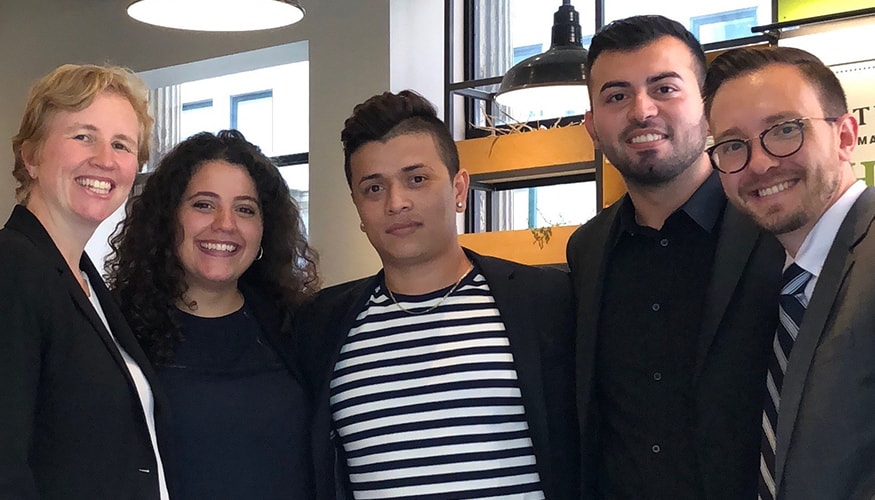Work with real clients on real cases
In our clinics, the law comes alive as students develop skills, navigate ethical concerns, and, as of their first summer, form a solid professional identity long before graduation. Our students graduate having conducted trials and hearings, argued motions and appeals, formed corporate entities, closed real estate transactions, and drafted contracts, settlement agreements and patent applications. Our clinics teach students to interview and counsel clients, to negotiate with opposing counsel, and to feel comfortable before an adjudicator. BLS students may meet, interview and counsel a client about possible immigration relief, how to contest the denial of employment benefits, or whether to dismiss a criminal charge.
In-house clinics take place at Brooklyn Law School and are taught and supervised by a faculty member. The student assumes the responsibility of the lawyer, making decisions, preparing work, and doing the tasks related to representing individual clients, entities, or working on projects. All clinics have two components: the casework and a seminar.

Brooklyn Law Incubator & Policy Clinic
Law in support of tech and innovation.
The Brooklyn Law Incubator & Policy (BLIP) Clinic functions as a modern, technology-oriented law firm. Since its inception in 2008, BLIP is training a new generation of lawyers who are well-versed across the spectrum of skills needed to represent emerging tech, Internet, communications, and new media companies.
Community Development & Movement Infrastructure Clinic
The Community Development & Movement Infrastructure Clinic (“CD-MIC”) uses the tools of corporate and transactional law to support grassroots efforts to make New York—and the country, and the planet—more equitable, sustainable, and just. Students in the CD-MIC represent group clients (primarily non-profits, small cooperative businesses, and unincorporated associations) on a broad variety of corporate and transactional matters.
Criminal Defense & Advocacy Clinic
Defending clients in the criminal legal system.
The Criminal Defense & Advocacy Clinic (CDAC) cultivates best practices in representing clients in the criminal legal system, including a deep look at what is considered normal or acceptable criminal defense practice. CDAC adds to a traditional defense clinical experience by specializing its representation, prioritizing criminal cases that involve or center on gender, with a significant number of clients who were arrested because of their involvement in the commercial sex industry or because of their experiences with gender-based violence.
Disability and Civil Rights Clinic
Advocating for adults with intellectual and developmental disabilities.
The Disability and Civil Rights Clinic focuses on protecting and advancing the civil rights of adults with intellectual and developmental disabilities. It is one of the only law school clinics in the country specializing in this area.
Housing Justice Clinic
The Housing Justice Clinic focuses on preserving housing stability for low-income households, working with tenants and homeowners.
LGBT Advocacy Clinic
Fighting for LGBT equality in legal cases.
Students contribute to the struggle for LGBT equality by representing LGBT people in a variety of civil legal matters. Working in teams, clinic students represent diverse members of the LGBT community on many different issues, including obtaining legal name changes and changing gender markers on identity documents for transgender clients, filing adoption petitions for LGBT parents seeking a legal relationship with their children, and much more.
Safe Harbor Clinic
Fighting for immigration and asylum status.
The Safe Harbor Project was launched in 1997. Since then, more than 300 students have assisted their clients to gain immigration status in the US. The clinic has secured asylum and/or related humanitarian relief for 125 principal applicants in both the Asylum Office and Immigration Court.
Sports Law Clinic
Legal Advocacy to Advance Athletes’ Rights and Sports Participation
The Sports Law Clinic provides direct legal services to individuals and entities involved with sports who encounter legal issues arising from their sports participation or commercial activity around sports. Sports have long been an important socio-cultural learning experience, an engine for economic opportunity, and a generator of manifold health benefits and life skills. Access to participate in sports has been recognized as a human right, along with recognition of fundamental procedural rights in sports disciplinary mechanisms. Care must be taken that individual participants are aware of these rights and treated fairly when they are at risk of exclusion from or exploitation by sports participation.